Our Briefing papers and discussion papers are summarised below. They can be downloaded by clicking on the relevant paper within 'Useful downloads' or you can request a printed copy by emailing clcproj@soton.ac.uk
Useful Downloads
- CLC Briefing Paper 1
- CLC Briefing Paper 2
- CLC Briefing Paper 3
- CLC Briefing Paper 4
- CLC Briefing Paper 5
- CLC Briefing Paper 6
- CLC Briefing Paper 7
- CLC Discussion Paper 1
- CLC Discussion Paper 2
Need the software?PDF Reader
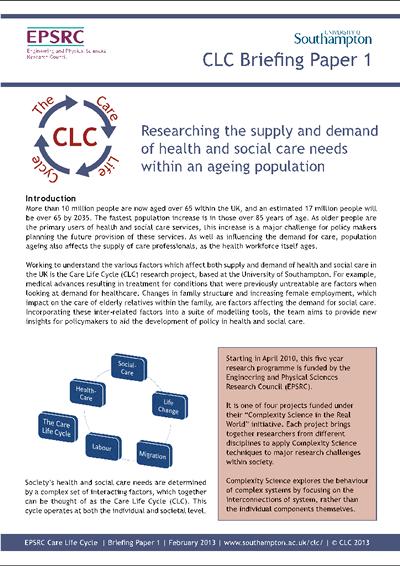
Briefing Papers
1. Researching the supply and demand of health and social care needs within an ageing population
This paper provides an overview of the Care Life Cycle research programme. It provides the background to the research, explains the type of information being gathered and how this data informs a variety of models being developed by the team.
Falkingham, J., Brailsford, S., Bullock, S. and Evandrou, M. (2013) Researching the supply and demand of health and social care needs within an ageing population.
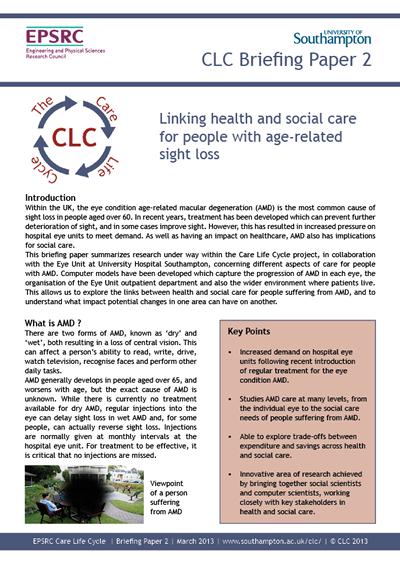
2. Linking health and social care for people with age-related sight loss
Age-related macular degeneration (AMD) is the most common cause of sight loss in those over 60. Research underway in collaboration with the Eye unit at University Hospital Southampton explores the different aspects of care for people with AMD. Computer models have been developed which capture the progression of AMD, the organisation of the Eye Unit, and the wider environment where patients live. This allows us to to explore the links between health and social care for those suffering from AMD, and the impact changes in one area can have on the other.
Viana, J., Rossiter, S., Channon, A., Brailsford, S. and Lotery, A. (2013) Linking health and social care for people with age-related sight loss.
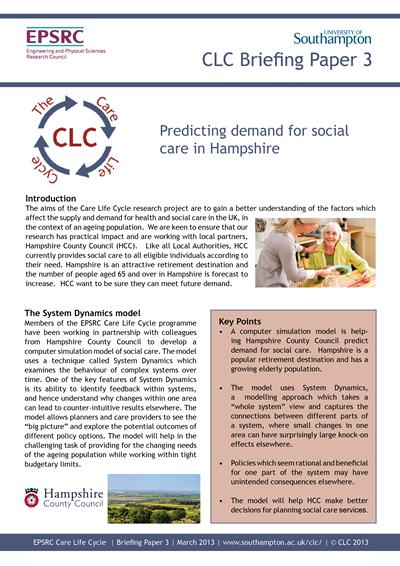
3. Predicting demand for social care in Hampshire
Working with local partners Hampshire Countil Council (HCC), researchers are developing a computer simulation model to help HCC predict future demand for social care. The model uses a technique called System Dynamics which examines the behaviour of complex systems over time. Small changes in one area can have surprisingly large knock-on effects elsewhere. This allows planners and care providers to see the "big picture" and explore the potential outcomes of different policy options.
Viana, J., Brailsford, S., Andrews, K. and Dittrich, R. (2013) Predicting demand for social care in Hampshire.
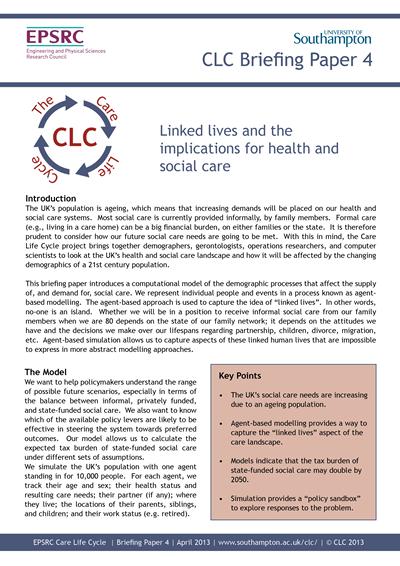
4. Linked lives and the implications for health and social care
How will our future social care needs be met ? Most social care is currently provided informally, however our ability to receive informal social care from our family in later life depends on the family network and decisions made over the lifespan regarding partnership, children, divorce, migration etc. This paper introduces a computational model where individual people and events are represented in a process known as agent-based modelling. This allows us to capture the idea of "linked lives" between family members. We can then simulate changes within the model, exploring the effects that different policies can have on the provision of informal social care in the future.
Noble, J., Silverman, E., Bijak, J., Rossiter, S. and Falkingham. J. (2013) Linked lives and the implications for health and social care.
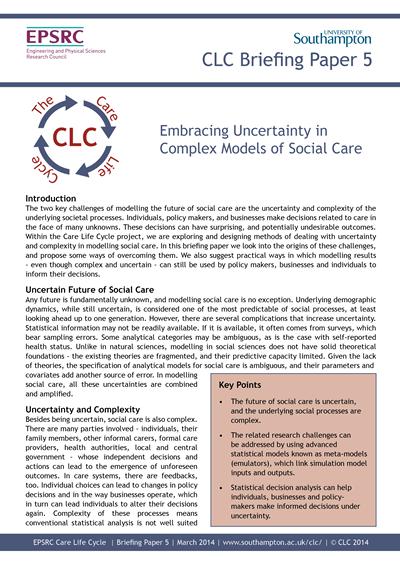
5. Embracing Uncertainty in Complex Models of Social Care
The two key challenges of modelling the future of social care are the uncertainty and complexity of the underlying societal processes. Individuals, policymakers and businesses make decisions related to care based on many unknowns. These decisions can have surprising and potentially undesirable outcomes. This paper looks at the origins of these challenges and suggests practical ways in which modelling results can still be used by policy makers, businesses and individuals to inform their decisions.
Bijak, J., Hilton, J., and Silverman, E. (2014) Embracing Uncertainty in Complex Models of Social Care.
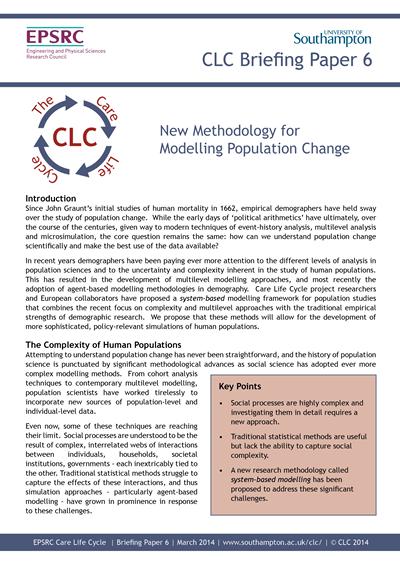
6. New Methodology for Modelling Population Change
How can we understand population change and make the best use of the data available? This paper introduces a new research methodology called system-based modelling which combines complexity and multilevel approaches with the traditional empirical strengths of demographic research. It explores the limitations of existing techniques and how this new approach can complement them.
Silverman, E., Corgeau, D. Franck, R. and Bijak, J. (2014) New Methodology for Modelling Population Change.
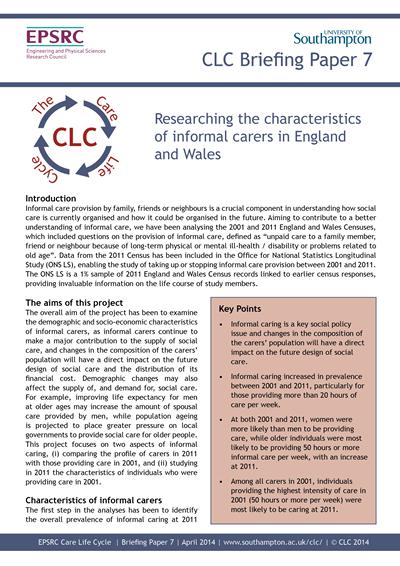
7. Researching the characteristics of informal carers in England and Wales
Care provided informally by friends, family and neighbours is a crucial component in the supply of social care within the UK. To better understand the characteristics of informal carers, the 2001 and 2011 England and Wales Censuses have been analysed. This paper compares the profile of carers in 2011 with those providing care in 2001. It also analyses individuals who were carers in 2001 and again in 2011 and identifies the main characteristics associated with caring within this period including age, marital status and number of hours caring per week.
Robards, J. Evandrou, M. Falkingham, J. and Vlachantoni, A. (2014) Researching the characteristics of informal carers in England and Wales.
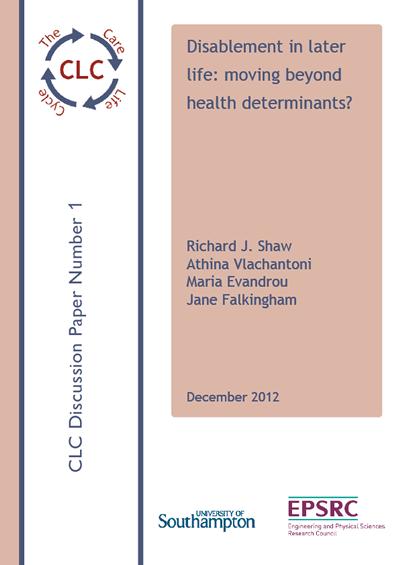
Discussion Papers
1. Disablement in later life: moving beyond health determinants?
This paper uses data from the English Longitudinal Study of Ageing to show that although an older person’s physical limitations are the strongest determinants of disability in later life, other characteristics relating to their social circumstances, psychological and mental well-being play a key role in determining disability and need for care.
Shaw, R., Vlachantoni, A., Evandrou, M., and Falkingham, J. (2012) Disablement in later life: moving beyond health determinants?
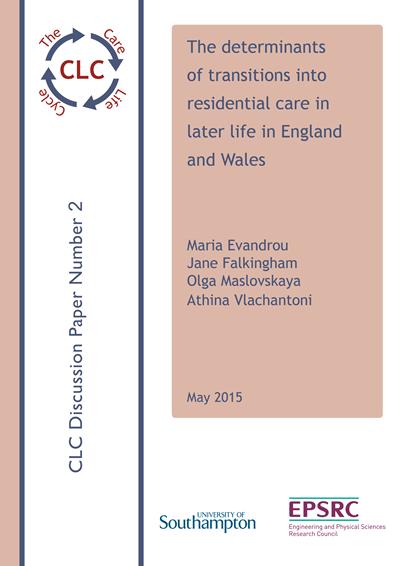
2. The determinants of transitions into residential care in later life in England and Wales
This paper investigates living arrangements in later life and using data from the British Household Panel Survey identifies key factors associated with older people moving into residential care.
Evandrou, M., Falkingham, J., Maslovskaya, O. and Vlachantoni, A. (2015) The determinants of transitions into residential care in later life in England and Wales